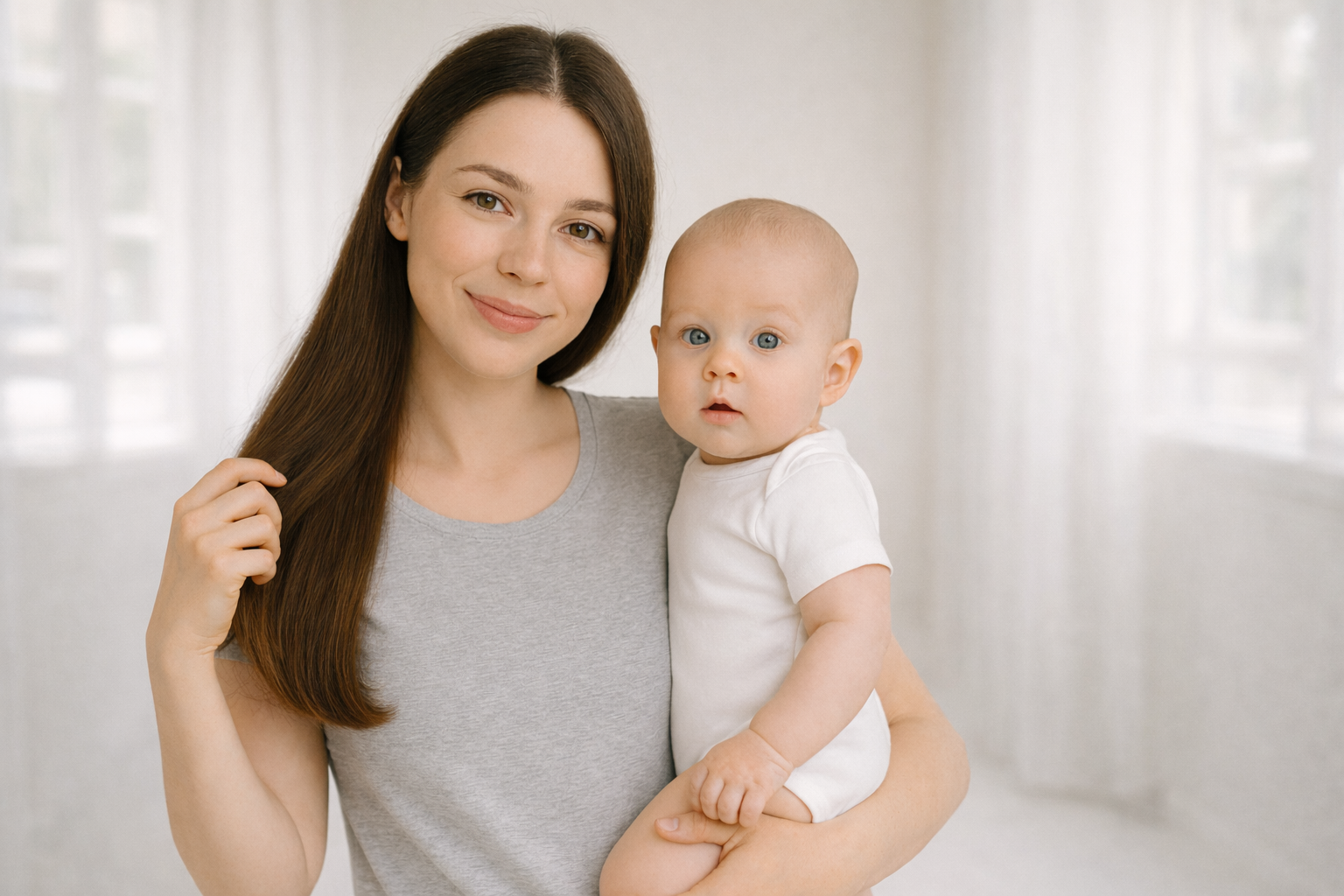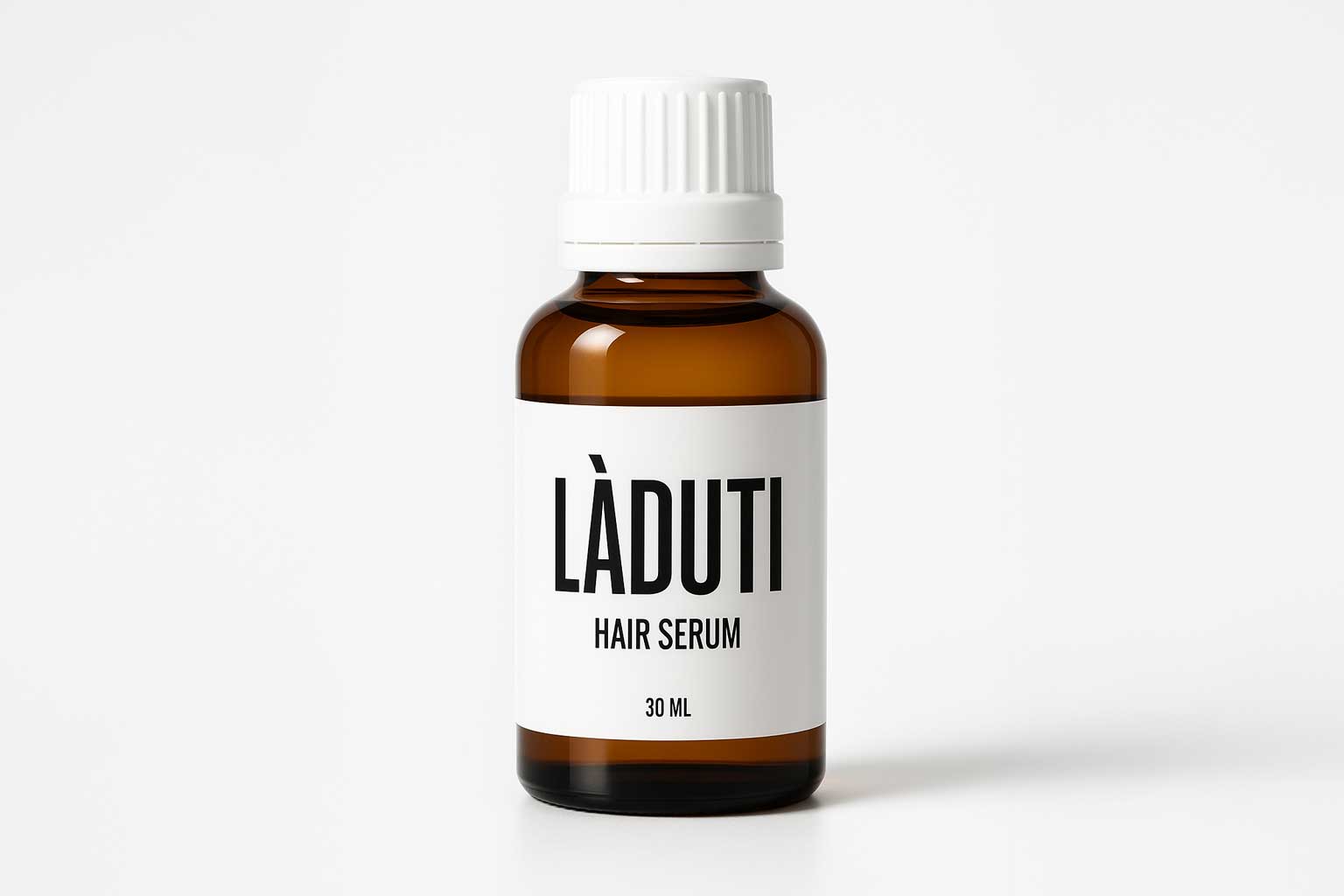Understanding hair loss after pregnancy: You should definitely know this!

Many new mothers are surprised when their hair suddenly starts to fall out a few weeks after giving birth. This so-called postpartum hair loss is widespread, but is often associated with worry. The good news is that in most cases it is temporary and can be managed well with the right strategies.
In this article, you will find out why hair loss occurs after pregnancy, how long it lasts and what measures can help to stimulate hair growth again.
1. Causes of hair loss after pregnancy
Hormonal change
- During pregnancy, oestrogen levels rise sharply → hair remains in the growth phase for longer and appears fuller.
- After birth, the level drops rapidly → many hairs enter the resting phase (telogen phase) at the same time.
- Result: Increased hair loss 2-4 months after birth.
Breastfeeding & nutrient deficiency
- Breastfeeding mothers have an increased need for nutrients.
- Common deficiencies: iron, zinc, B vitamins, omega-3 fatty acids.
- These deficiencies can also increase or prolong hair loss.
Stress & lack of sleep
- A lack of sleep, physical strain and stress are often part of everyday life for new parents.
- Consequences:
- Disturbed hormone balance
- Reduced blood flow to the scalp
- Weakened hair follicles
2. Symptoms: How do I recognize hair loss after pregnancy?
Conspicuous signs in everyday life
Postpartum hair loss is often already noticeable in everyday life. Typical symptoms are
- Significantly more hair in the brush or shower
- Noticeable amount of hair on the pillow or clothing
- Lightening areas, especially in the forehead and temples
- An overall thinner hair structure
Changes in the feel of the hair
Many affected women report that their hair feels less full and strong - even if there are no bald patches.
Why is that?
- During pregnancy, many hairs were in the growth phase at the same time.
- After birth, these hairs go into a synchronized resting phase.
- This makes the hair loss particularly severe, even though the hair roots remain intact.
Note: This form of hair loss is temporary in most cases. As soon as the hormone level stabilizes, the hair usually grows back on its own.
3. Duration: How long does the hair loss last?
Hair loss after pregnancy typically begins 3-4 months after giving birth. This is because the prolonged growth phase (anagen phase) during pregnancy ends and many hairs enter the resting phase (telogen phase) at the same time.
Typical course
- Start → 3-4 months after delivery
- Duration → In most cases 6-9 months
- Then → Hair growth stabilizes again and the hair that has fallen out grows back
Many women notice an increase in hair in the brush, in the drain or on the pillow during this time. Although the hair loss may seem worrying, in the vast majority of cases it is temporary and reversible.
When medical clarification makes sense
If the hair loss lasts longer than 9 months or is particularly severe, a medical examination should be carried out. Among other things, the following factors will be checked:
- Blood values (e.g. iron, ferritin, vitamin D, zinc)
- Thyroid function (hypothyroidism or hyperthyroidism can increase hair loss)
- Hormone balance (e.g. increased androgens, cortisol levels)
Tip: A healthy lifestyle with a balanced diet, stress management and gentle scalp care can support regeneration during this phase and promote hair growth.
4. Solutions & Treatment Options
1. Nutrient-rich diet
A balanced diet supports the hair roots from the inside. This is particularly important:
- Iron, zinc and biotin → essential for hair metabolism
- Proteins → Basic building blocks for hair growth
Recommended foods
- Pulses
- Wholemeal products
- Nuts & seeds
- Green vegetables (e.g. spinach, broccoli, kale)
Tip: If hair loss persists, it is worth having a blood test (e.g. iron, ferritin, vitamin D, thyroid). Supplements should only be taken if there is a proven deficiency.
2. Gentle Hair Care
During this sensitive phase, it is important not to put additional stress on the hair.
Avoid as far as possible
- Heat styling (straightener, curling iron, hairdryer on the highest setting)
- Tight hairstyles such as plaits or buns
- Chemical treatments (dyeing, bleaching, perming)
Instead, rely on
- Mild shampoos without sulphates
- Nourishing treatments & oils that moisturize and soothe the scalp
3. Stress Reduction & Recovery
Stress has a negative effect on the hormone balance and can increase hair loss. This makes it all the more important to consciously take short breaks.
Helpful methods for hair loss after pregnancy
- Yoga or meditation for more inner peace
- Breathing exercises for relaxation in between
- Walks in the fresh air to reduce stress
- Optimize sleep: Even short power naps support the body's regeneration

4. Support with high-quality Hair Serums
Hair serums can be a valuable supplement for hair loss after pregnancy. They contain concentrated active ingredients that act directly on the scalp and hair roots to accelerate regeneration. Through targeted application, they can support hair growth and strengthen the existing hair structure at the same time.
Why hair serums are helpful
- Direct effect: Serums are applied directly to the scalp and thus reach the hair follicles without any detours.
- Targeted nutrient supply: Active ingredients such as caffeine or rosemary oil can stimulate blood circulation and improve the absorption of nutrients.
- Suitable for everyday use: They are easy to integrate into your skincare routine - a few drops a day or several times a week are often enough.
Important active ingredients in hair serums
- Caffeine
- Stimulates blood circulation in the scalp
- Promotes the growth activity of the hair roots
- Can prolong the anagen phase (growth phase)
- Rosemary oil
- Strengthens and stimulates circulation
- Studies show comparable effects to minoxidil, but gentler and with no known side effects
- It also soothes the scalp and has a mild anti-inflammatory effect
- Procapil™ & AnaGain™
- Modern active ingredient complexes that act directly on the hair growth cycle
- Support the anchoring of the hair in the scalp
- Promote the regeneration of weakened hair follicles
Benefits of hair serums for hair loss after pregnancy
- Directly effective at the hair root: They work exactly where hair loss occurs.
- Easy to use: Usually just a few drops daily - even without elaborate care routines.
- Can be flexibly combined: Can be easily combined with other measures such as a healthy diet, nutritional supplements or stress reduction.
- Gentle & natural: Many serums are based on plant-based ingredients that are well tolerated and do not contain aggressive chemicals.
Tips for using hair serums
- Regularity: Continuous use over several months is necessary for visible results.
- Massage: Serums are best worked in with light scalp massages - this also increases blood circulation.
- Patience: Hair grows slowly - initial success often becomes apparent after 3-6 months.
In conclusion, hair loss after pregnancy is usually temporary.
In most cases, hair loss after pregnancy is a completely normal side effect of hormonal changes and often subsides on its own. Nevertheless, the process can be actively supported: A nutrient-rich diet, targeted stress reduction and gentle, restorative care can help hair roots to recover more quickly and hair growth to regain its balance.
The Laduti Hair Serum starts right here: It combines a variety of high-quality, natural ingredients that have been scientifically studied in relation to hair and scalp health:
- Procapil™: Strengthens hair anchoring and protects the follicles from the ageing process.
- AnaGain™ (pea sprout extract): Reactivates inactive hair follicles and prolongs the growth phase.
- Biotin: Promotes keratin formation and ensures strong hair structures.
- Caffeine: Stimulates blood circulation in the scalp and can activate the hair roots.
- Rosemary extract: Has an antioxidant effect, promotes regeneration and supports scalp balance.
By combining these natural active ingredients and innovative complexes, our serum offers modern, gentle and long-term care that strengthens your scalp and can create optimal conditions for healthy and stronger-looking hair.

FAQ - Hair loss after pregnancy
How long does hair loss last after pregnancy?
Usually 6-9 months. After that, hair growth usually normalizes on its own.
Can hair loss after pregnancy be permanent?
In most cases, it is only temporary. If it persists for longer than 12 months, a doctor should check for possible causes such as thyroid disorders.
Does breastfeeding help against hair loss?
Breastfeeding is not directly responsible for hair loss, but can contribute to it due to increased nutrient requirements if important vitamins and minerals are lacking.
Which vitamins are important for hair loss after pregnancy?
Iron, zinc, biotin, vitamin D and B vitamins in particular support the hair roots.
Can a hair serum be useful after pregnancy?
Yes - a plant-based serum with ingredients such as caffeine, Procapil™ or AnaGain™ can support the hair follicles and stimulate natural hair growth.

